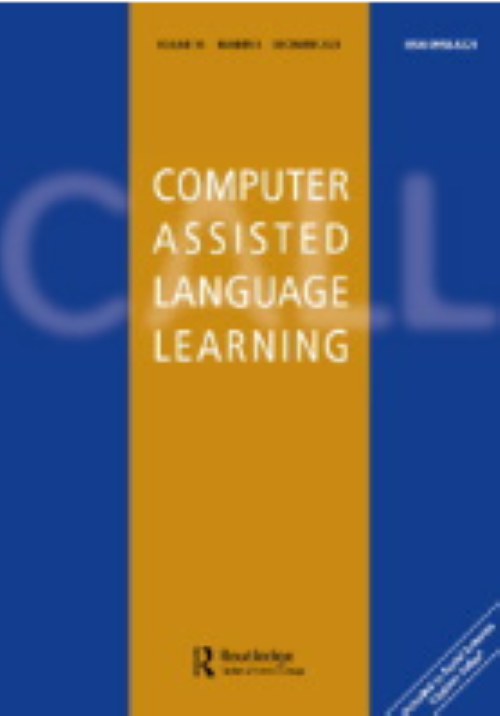The influence of game-based learning media on academic English vocabulary learning in the EFL context
IF 6
1区 文学
Q1 EDUCATION & EDUCATIONAL RESEARCH
引用次数: 0
Abstract
AbstractDespite the growing interest in game-based learning (GBL) over the last two decades, the influence of Augmented Reality-based GBL on English vocabulary growth is still not well understood when compared with other forms of media, especially with regard to academic English vocabulary. This quasi-experimental study with 90 Chinese English-as-a-foreign-language (EFL) university students investigated the efficacy of GBL supported by three forms of media (paper, digital, and AR) for learners’ academic English vocabulary growth by measuring their immediate recall and long-term retention. The study involved one experimental and two control groups, each learning 17 target words relating to the digestive system by using AR-based GBL (AR-GBL), digital-based GBL (D-GBL), and paper-based GBL (P-GBL) approaches. Participants completed a pretest, an immediate posttest, and two delayed posttests (one and three weeks after the intervention) on these target words. A mixed 3 × 4 repeated measures analysis revealed a quadratic trend in vocabulary growth across all three media-based GBL approaches. AR-GBL’s effect on immediate academic vocabulary learning was superior to D-BGL’s and equivalent to P-GBL’s effect. All approaches exhibited similar declines in delayed retention after one week, with no significant differences. Notably, AR-GBL indicated a marginally significant difference compared to D-GBL in terms of retention at the three-week delayed posttest. These findings underscore the need to capitalize on each approach’s unique benefits as well as spaced learning to optimize EFL academic vocabulary learning.Keywords: Game-based learningaugmented realityinstructional mediaacademic vocabularyEnglish as a Foreign Language Disclosure statementNo potential conflict of interest was reported by the author(s).Additional informationFundingThis research was supported by Jiangsu Education Science 13th Five-Year Plan Fund [Project Ref. No. C-b/2020/01/10], Nanjing Agricultural University Education and Teaching Innovation Fund [Project Ref. No. 2021Y041], and Nanjing Agricultural University College of Foreign Studies Research Fund [Project Ref. No. WY202203].游戏学习媒体对英语语境下学术英语词汇学习的影响
摘要尽管近二十年来人们对基于游戏的学习(GBL)越来越感兴趣,但与其他形式的媒体相比,基于增强现实的GBL对英语词汇增长的影响仍然没有得到很好的理解,特别是在学术英语词汇方面。本研究以90名中国英语作为外语的大学生为研究对象,通过测量他们的即时记忆和长期记忆,探讨了三种媒体(纸质、数字和AR)支持下的GBL对学术英语词汇增长的效果。该研究包括一个实验组和两个对照组,每个组通过基于ar的GBL (AR-GBL)、基于数字的GBL (D-GBL)和基于纸张的GBL (P-GBL)方法学习17个与消化系统相关的目标单词。参与者完成了对这些目标单词的前测、即时后测和两次延迟后测(干预后一周和三周)。一项混合3 × 4重复测量分析显示,在所有三种基于媒体的GBL方法中,词汇量增长呈二次型趋势。AR-GBL对即时学术词汇学习的效果优于d - gbl,与P-GBL的效果相当。一周后,所有方法在延迟记忆方面都表现出相似的下降,没有显著差异。值得注意的是,与D-GBL相比,AR-GBL在延迟三周后测的保留率方面显示出微显著差异。这些发现强调了利用每种方法的独特优势以及间隔学习来优化英语学术词汇学习的必要性。关键词:基于游戏的学习增强现实教学媒体学术词汇作为外语的英语披露声明作者未报告潜在的利益冲突。本研究得到江苏省教育科学“十三五”规划基金资助[项目编号:No. 8226]。C-b/2020/01/10]、南京农业大学教育教学创新基金[项目编号:2021Y041]、南京农业大学外国语学院科研基金[项目编号:2021Y041]、南京农业大学外国语学院科研基金[项目编号:2021Y041]。WY202203]。
本文章由计算机程序翻译,如有差异,请以英文原文为准。
求助全文
约1分钟内获得全文
求助全文
来源期刊

Computer Assisted Language Learning
Multiple-
CiteScore
18.50
自引率
12.90%
发文量
74
期刊介绍:
Computer Assisted Language Learning (CALL) is an intercontinental and interdisciplinary journal which leads the field in its dedication to all matters associated with the use of computers in language learning (L1 and L2), teaching and testing. It provides a forum to discuss the discoveries in the field and to exchange experience and information about existing techniques. The scope of the journal is intentionally wide-ranging and embraces a multitude of disciplines.
 求助内容:
求助内容: 应助结果提醒方式:
应助结果提醒方式:


